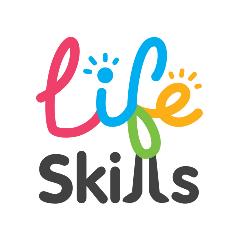
What are Life Skills? Life skills are behaviors that enable individuals to adapt and deal effectively with the demands and challenges of life. In terms of early development, these are often called “learning to learn skills” which can be developed through intentional activities. There are many such skills, but core life skills, according to the World Health Organization (WHO) include the following:
- Self-awareness
- Empathy
- Critical thinking
- Creative thinking
- Decision making
- Problem Solving
- Effective communication
- Interpersonal relationship
- Coping with stress
- Coping with emotion
 The Bluebee Pals app is a fun and easy way to begin working on many of these skills with young children. Children learn best through play!
The Bluebee Pals app is a fun and easy way to begin working on many of these skills with young children. Children learn best through play!
In the Bluebee Pals app there are 5 colorful and interactive rooms to explore with your child. By talking about, asking questions, and encouraging free play, you can focus on and reinforce many early learning and life skills.https://www.bluebeepals.com/bluebee-pals-app/
Bedroom: Discuss bedtime routines with your child. What routines do you have? What do you wear to bed? Talk about things that are found in a bedroom (vocabulary, categorization skills), practice listening, choose your favorite color, and learn the meaning of “on/off”. Ask the child to describe his/her own bedroom.
Bathroom: Discuss your bathroom routines. Practice listening and following instructions, practice brushing teeth, talk about washing hands, learn to recognize hot/cold water, on/off, and categorize things that are found in a bathroom.
Kitchen: Discuss things that are found in a kitchen. Do you see something in the Bluebee kitchen that you have in your kitchen (critical thinking). Discuss recycling, follow directions, name foods and categorize them. What are your favorite kinds of foods? What vegetables are green? Yellow? Red?
Living room: What kinds of things are found in a living room? Name the things in the Bluebee living room. What is in your living room? What kinds of things can you do in your living room? How can you help your parents keep the living room tidy?
Playroom: The playroom contains mini-games for free play. Tap on an item in the room to play an educational game.
- Balloons: Match colors to foods, talk about different types of food groups and categorize fruits vs vegetables.
- Robot. Practice sequencing, critical thinking, following directions and problem solving skills while building a robot.
- Voice recorder: Listen and follow directions to learn to use a microphone to record your own voice, or Bluebee Pal. Use problem solving skills to learn how to record and listen to the sounds around you. Can you talk in a happy voice? In a sad voice? In a soft voice?
- Truck: Name the kinds of trucks you see as you slide them around the racetrack. Which one is the smallest? The largest? Can you put them in order from smallest to largest?
- Ice cream truck: Seek and find the hidden Bluebee Pals on their island, then match them to their chairs on the beach. Can you name all of the Bluebee Pals? Can you match them to their names?
- Puzzle: Complete a 6 piece Bear puzzle (problem solving, critical thinking).
- Construction hat: Dress up your favorite Bluebee Pal and talk about the different occupations they represent. What would you like to be when you grow up? What jobs do your parents do?
- Maze: Practice thinking and problem solving skills as you complete a maze. How many ways are there to get out?
- White board: Practice naming the letters of the alphabet and their order. What can you name that starts with the letter D? What letters are in your name?
Tips—When working with your child and the Bluebee Pal app, focus on the following areas to maximize language and learning skills:
* Make choices
* Talk about grouping similar items into categories
* Assist your child in following directions
* For literacy skills, help your child learn to recognize sounds and letters
* Talk about daily living skills and routines including hygiene, cooking, cleaning, brushing teeth, bath time, and bed time.
* Find action words and talk about them. Make a sentence with action words such as playing, brushing, sleeping, bathing, washing.
* Talk about the items in each room and what they are used for to build vocabulary skills.
* Practice sequencing the tasks in the app, such as taking a bath, brushing your teeth, getting ready for bed.
* Talk about how your child feels when it is time to eat, time to take a bath, time to clean up, or time for bed.
* Practice negation while you are working with your child, such as “Don’t forget to turn off the light” or “Don’t forget to brush his teeth all the way”. Which foods are not red? What things do not belong in the kitchen?
* Ask questions to improve inferencing skills, such as “How do you think he got so dirty? or What do you think he likes to eat for lunch”?
